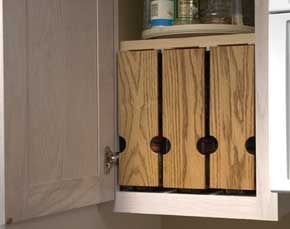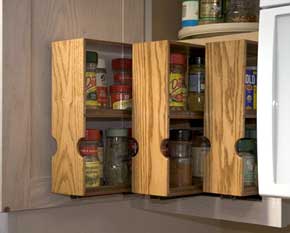

For more great plans click on the banner below.
|
|
We had always kept our spices on a two tier lazy susan which made getting spice bottles out of the middle difficult. I knew there had to be a better way and went to work. I came up with a three pullout spice rack that has a shelf in the middle giving you two shelves on each pullout. I made the fronts out of oak, the tops, bottoms, shelves and backs out of plywood and edged the shelves with walnut. I think they turned out pretty neat.
I measured the cabinet opening to determine the width and height. Since our cupboard doors close flat to the front of the cupboard frame I measured from the back to the face.
 7-Pc. Forstner Bit Set

I cut the backs from 1/4" plywood to the same dimensions as the fronts.

I ran the top and bottom edges along the fence and then moved them out a little and ran them through again to finish the dado. I CAREFULLY move the board back and forth against the fence to square up the dado.

Here's a picture of the dado without moving it back and forth and after I've gone back and forth.
 Here's what the back of the front looks like with dado's. The back pieces should look the same less the finger cutouts.
 After all the dado's are cut glue and clamp the racks together.
 I made my own square clamp to help square up everything while it was gluing. You can also get a plastic one from Rockler that works well.
 Clamp-It® Assembly Square and Clamps (Sold Separately) I made the shelf edges out of walnut. I cut them 1/4" wide, 3/8" hight and the length of the shelves. I used a roundover bit to soften the top outside edges.
 Rockler 3-Pc. Roundover/Beading Bit Set I glued each edge to the top-sides of each shelf.
center>
 Irwin® Quick-Grip® SL300 Clamps After the glue dries sand and finish the wood to suit your taste. Installing the shelf required some extra work. First I had to install a spacer in the bottom of the cabinet to get the drawer slides up high enough to clear the front lip. I used some Formica for this.

I used over travel slides for the bottom of the racks and I wish I had used just full extension slides. With the over travel slides the racks come out beyond the cupboard and there is no support for the top out there.
 I cut them on my tablesaw using magnetic featherboard to help guide them.
 Magswitch Magnetic Table Saw Featherboards
Once I had the tracks cut I screwed them onto the bottom of the shelf above.
 Since the slides are screwed to the bottom of the rack I had to shorten the screw so that it would not come through. I carefully used my grinding wheel to shorten them up.

First I screwed a good screw in until it was just about through the other side of the wood. Then I backed it out and put in the shortened screw. After they were cured Marilyn filled them up and they worked perfectly in our kitchen. That's about it. We hope you liked this project. If you build it and your friends ask where you got such a clever idea, please tell them that you got it at RunnerDuck.com. |
|
The AllAmerican RunnerDuck Review Visit our Blog, www.runnerduckreview.wordpress.com, and sign up to receive notifications when it is updated. Our newsletter is a monthly blog with woodworking projects, crafts, recipes, and more. When you get to our blog just enter your email address and click "Sign Me Up". This is what it looks like:

|


 I like using the Quick Grip clamps, they are very handy on a project like this.
I like using the Quick Grip clamps, they are very handy on a project like this.